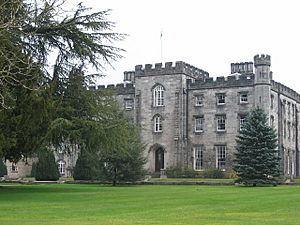Tulliallan Castle facts for kids
Tulliallan Castle is a large and important building in Kincardine, Fife, Scotland. It's not the first building with this name, but it's the one we know today. The castle mixes two cool styles: Gothic and Italian. It sits on about 90 acres (36 hectares) of beautiful parkland. This land is just north of the Kincardine Bridge, which crosses the Firth of Forth.
Since 1954, Tulliallan Castle has been the home of the Scottish Police College. This is where police officers in Scotland get their training. For a short time, starting in 2013, it was also the main office for Police Scotland, which is the national police service for the whole country. However, in 2014, the main office moved to Stirling for a while.
Contents
What is Tulliallan Castle?
Tulliallan Castle is a grand house that looks like a castle. It was built between 1812 and 1820. The design combines two different styles of building: Gothic and Italian. Gothic style often has pointed arches and tall windows, while Italian style might have more balanced shapes and classical details. The castle is surrounded by a large park, making it a very impressive place.
Who built Tulliallan Castle?
The castle was built for Admiral Lord Keith. He was a very important naval officer. He even worked with Lord Nelson, who was a famous British admiral. Lord Keith used money he got from capturing enemy ships during wars to build this amazing castle. It's even said that French prisoners of war helped with the building work!
A Look at the Old Tulliallan Castle
Did you know there was an even older castle called Tulliallan? It was built way back in 1304. This older castle was about half a mile (800 meters) northwest of where the current castle stands.
Why was the old castle built?
In 1304, Edward I of England ordered the old castle to be made stronger. This shows it was an important place for defense. Over many years, different powerful families owned it, including the Douglases, the Edmonstones, the Blackadders, and the Bruces.
What did the old castle look like?
The old Tulliallan Castle was a fortified house. This means it was built to be strong and protect people. It had a keep, which is a strong tower, and a special type of ceiling called a rib vault on the ground floor. People stopped using this old castle in the 1600s.
Tulliallan Castle and the Police
Tulliallan Castle has a very important role in training police officers in Scotland. Before the Second World War, police officers in Scotland didn't have one main place to train. Each police force did its own training.
How did the castle become a police college?
After the Second World War, leaders decided it would be better to have one central place for all police training in Scotland. Tulliallan Castle was chosen for this important job. The Scottish Home Department bought the castle in 1950 for £9,100.
What happened after the castle was bought?
The castle was updated and fixed up to be ready for its new purpose. The first training courses for police inspectors and sergeants started in 1954. Over the years, many new buildings and facilities have been added around the castle. These include places for officers to live, eat, train, and learn.
Today, the main castle building is used for the administration of the Scottish Police College. It's also the official home for the Chief Constable of Police Scotland.
Images for kids
 | Bayard Rustin |
 | Jeannette Carter |
 | Jeremiah A. Brown |



